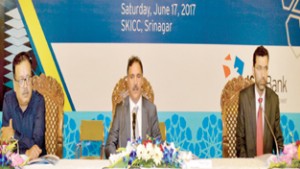Excelsior Correspondent

SRINAGAR, June 18: State Government’s stake in Jammu and Kashmir Bank has risen up to 59% due to recent capital infusion of Rs 532 crore.
This was stated by Commissioner Secretary to Government, Finance Department Navin Kumar Choudhary in the presence of J&K Bank Chairman Parvez Ahmed and other dignitaries during the 79th Annual General Meeting of the bank held at SKICC.
“As the major stakeholder in J&K Bank, the State Government remains ever committed and serious in its support as it is the most premiere financial institution of the State”, Choudhary said, adding “at the critical juncture, when the bank was in dire need of additional capital, the Government of J&K infused Rs 532 crore as its additional equity thereby taking its share in the bank from 53 pc to 59.23 pc”.
“This infusion will translate into growth and expansion and at the same time boost the confidence of all other stakeholders in the bank. It will also help the bank to raise further Rs 700 crore from the capital market to create strong capital cushion for the bank. We assure the people that the Government in all circumstances will protect and enhance the prestige of the bank”, he said.
Earlier, in a significant development, J&K Bank revived much needed professionalism in its board by inducting professionals of highest repute as independent directors on board of the bank. This has been done without altering the basic character of the board with two-third state-subject directors and maintaining non state subject seats within stipulated one third of total size.
Following the approval of its shareholders at the 79th Annual General Meeting (AGM), the eminent personalities accredited with nationwide recognition of their expertise in respective fields inducted in the board of the Bank are Vijayalakshmi R Iyer – Ex-CMD Central Bank of India (Presently Director with IRDA); Dr Sanjiv Agarwal – Fellow Member of the Institute of Chartered Accountants of India and Institute of Company Secretaries of India, Associate Member of the Institute of Chartered Secretaries and Administration, London (UK); Dr Pronab Sen – a renowned Economist; Sunil Chandiramani – Chartered Accountant, a qualified technologist and IT security specialist with a vast expertise in Corporate Governance; Rahul Bansal – MBA from London with 17 years of experience as an industrialist and D K Pandoh – Fellow Member of the Institute of Company Secretaries of India with 20 years of experience in taxation, company law and foreign exchange.
The Board headed by Chairman and CEO, Parvez Ahmed with Government and RBI representative as its members shall now have Abdul Majid Mir, Azharul Amin (reappointed in the AGM), Mohd Ashraf Mir, Mohd Maqbool Rather in addition to newly inducted members as its Directors.
While addressing the AGM, Chairman of the Bank said, “the slowdown in the economic activity in the country resulted in poor credit off-take and thereby hampered activity mainly in infra sectors thus paralyzing the portion of the banking balance sheets comprising of exposure to companies operating in these sectors. This resulted in creation of huge NPAs and Capital inadequacy for almost all the banks operating in the country.”
“At home, we were yet to come out of the devastating effects of September 2014 deluge, Kashmir valley experienced a dreadful summer last year which further choked the sustaining pulse of the State economy. As the leading bank of the State, we immediately shifted our focus to make the condition of our borrowers relevant to the times than betting on their capability. The Special Restructuring Package approval from RBI with backing from Government of Jammu and Kashmir proved to be a perfectly timed enabler to ensure cash-flow streaming”, he added.
Talking about some of the positives steps taken during the last financial year, he said, “with focus shifting completely to cleanup and consolidation, the bank has not been able to achieve significant numbers during the year. Upgrade of our recovery and resolution methodology assumed the highest significance post recognition of asset quality woes. And creation of Impaired Assets Portfolio Management (IAPM) vertical complimented our resolve of effecting as much recoveries which also helped to release the squeezing pressure on our capital base”.
Speaking about the positive effects of demonetization process, he stressed, “It offered us the opportune time and platform to push for complete digitization of our service delivery models through our specialist technology vertical. It is the dividend of this technology driven transformation which shall remain our cherished memory of this most difficult year in the history of our bank.”

